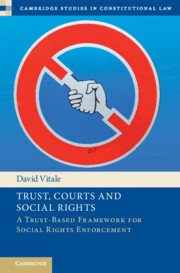Book contents
- Trust, Courts and Social Rights
- Cambridge Studies in Constitutional Law
- Trust, Courts and Social Rights
- Copyright page
- Contents
- Acknowledgements
- Table of Cases
- 1 Introduction
- 2 Conceptualising Trust in the Social Rights Context
- 3 The Citizen–Government Relationship in a Network of Trust Relationships
- 4 A Trust-Based Framework for Enforcing Social Rights?
- 5 The Expectation of Goodwill
- 6 The Expectation of Competence
- 7 The Expectation of Fiduciary Responsibility
- 8 Conclusion
- Bibliography
- Index
- Cambridge Studies in Constitutional Law
4 - A Trust-Based Framework for Enforcing Social Rights?
Published online by Cambridge University Press: 08 February 2024
- Trust, Courts and Social Rights
- Cambridge Studies in Constitutional Law
- Trust, Courts and Social Rights
- Copyright page
- Contents
- Acknowledgements
- Table of Cases
- 1 Introduction
- 2 Conceptualising Trust in the Social Rights Context
- 3 The Citizen–Government Relationship in a Network of Trust Relationships
- 4 A Trust-Based Framework for Enforcing Social Rights?
- 5 The Expectation of Goodwill
- 6 The Expectation of Competence
- 7 The Expectation of Fiduciary Responsibility
- 8 Conclusion
- Bibliography
- Index
- Cambridge Studies in Constitutional Law
Summary
In preparation for Chapters 5–7 – which detail the three components of the proposed trust-based framework – this chapter addresses three issues. With reference to the social rights literature, it first substantiates the conclusion that social rights are justiciable, justifying the need for an enforcement framework to be used by the courts. Secondly, the chapter describes how the courts can use the concept of political trust as the basis for a social rights enforcement framework. It explains that under the trust-based framework, the courts promote the elected branches’ trustworthiness with respect to social rights. The courts specifically hold the elected branches to a ‘standard of trustworthiness’, effectively enforcing the three constituent expectations of trust in the citizen-government relationship – goodwill, competence and fiduciary responsibility. Lastly, the chapter outlines four justifications – theoretical, instrumental, practical and democratic – for why political trust should provide the basis for a social rights enforcement framework.
Keywords
- Type
- Chapter
- Information
- Trust, Courts and Social RightsA Trust-Based Framework for Social Rights Enforcement, pp. 83 - 126Publisher: Cambridge University PressPrint publication year: 2024

